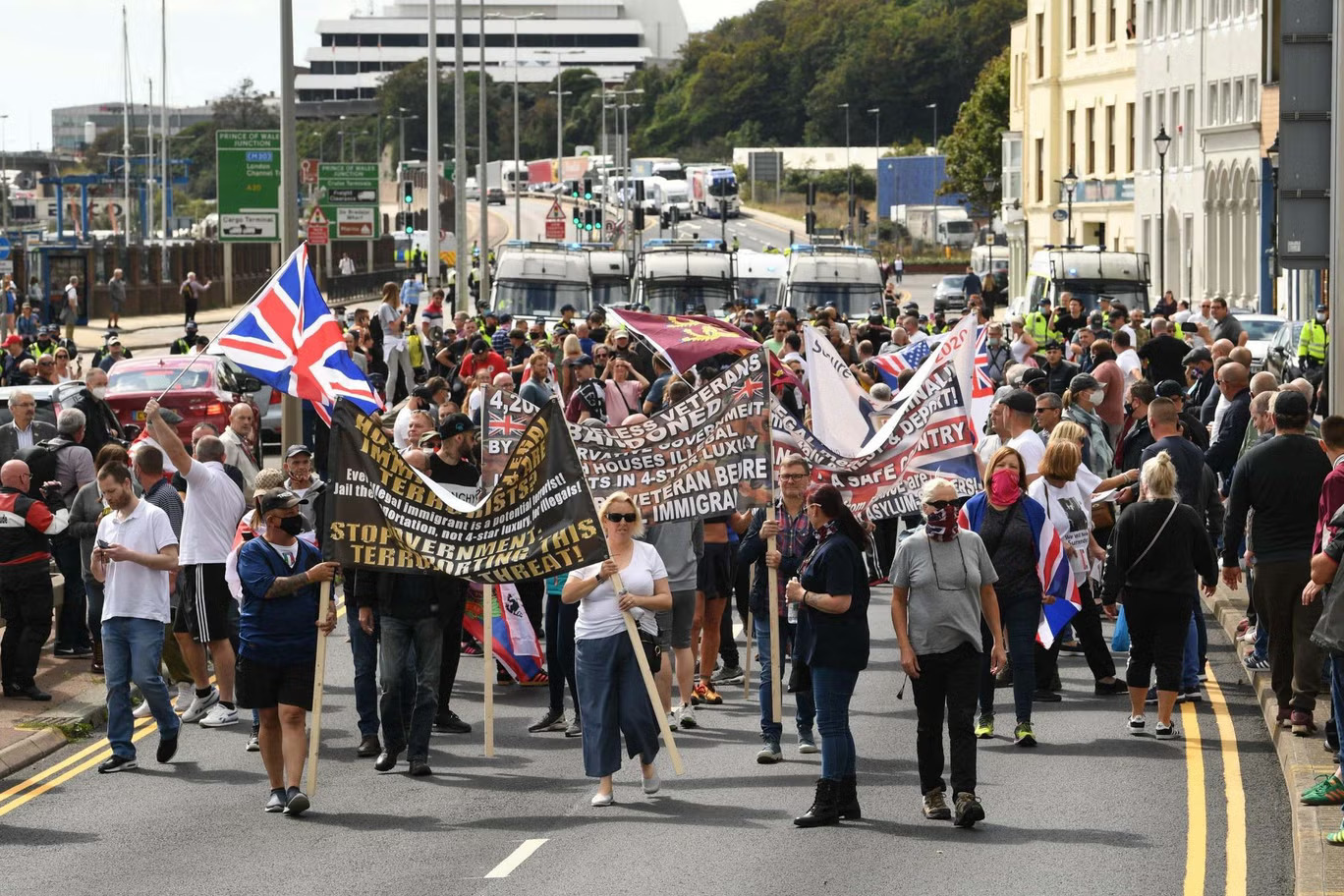Across the United Kingdom, a wave of anti-immigration protests has erupted in 2025, driven by growing public frustration over illegal immigration and government asylum policies. From small towns like Epping in Essex to urban centres like Hull and Dover, citizens are voicing concerns about demographic shifts, strained public services, and perceived threats to community safety. Yet, these protests—and the voices amplifying them—are facing what many describe as systematic suppression by the government, law enforcement, and mainstream media (MSM). This article examines the crackdown on anti-immigration sentiment, the silencing of dissent on social media, and the troubling questions surrounding the government’s approach to illegal immigration, particularly in light of public safety fears.
A Nation in Protest: The Grassroots Uprising
The summer of 2025 has seen a surge in demonstrations against illegal immigration, particularly in response to the government’s continued use of hotels to house asylum seekers. In Epping, locals gathered outside the Bell Hotel, a migrant accommodation centre, only to be met with pre-emptive deployments of riot police from Essex and the Metropolitan Police. Similar scenes unfolded in Hull, Dover, and Aldershot, where protests, often described as peaceful by participants, were met with arrests and heavy-handed policing. According to reports, at least 55 arrests were made in London alone in late July, with many protesters claiming selective enforcement against those opposing government policy.
These protests stem from a deep-seated frustration among ordinary citizens—plumbers, teachers, and small business owners—who feel their concerns about illegal immigration are being ignored. Many cite the rapid demographic changes in small towns, where the arrival of young, male migrants has strained local resources and heightened fears for community safety. Office for National Statistics (ONS) data confirms a 32% rise in migration to rural areas since 2022, largely driven by asylum housing programs. Protesters argue that these changes threaten not just public services but the cultural fabric of Britain, with pub closures and shifts in local traditions symbolising a broader erosion of identity.
Silencing Dissent: Social Media and MSM Crackdowns
One of the most alarming aspects of this unrest is the government’s response, which critics argue amounts to a deliberate suppression of free speech. In July 2025, the Home Office announced the formation of the National Internet Intelligence Investigations team, an elite unit tasked with monitoring social media for “anti-migrant posts.” Operating from the National Police Coordination Centre (NPoCC) in Westminster, this team aims to flag potential civil unrest and “maximise social media intelligence.” Shadow Home Secretary Chris Philp has condemned the initiative, accusing the government of trying to “police what you post, what you share, what you think” instead of addressing street-level concerns.
The mainstream media has also played a role in this suppression. Legacy outlets like the BBC and Sky News have been accused of underreporting or ignoring these protests, leaving independent media and citizen journalists to fill the void. Ofcom’s latest media consumption report notes that under-35s now rely more on YouTube and Telegram for news than traditional TV, reflecting a growing distrust in MSM. This media vacuum has fueled perceptions that the government and MSM are colluding to downplay public discontent, particularly when it comes to immigration.
On social media, the crackdown is even more pronounced. New laws proposed in 2025 make it a criminal offence to promote small boat crossings online, but the broader monitoring of “anti-migrant” content has raised concerns about overreach. Posts expressing fears about illegal immigration or questioning government policy have been flagged or removed, with some users facing legal consequences. One man was charged for using “threatening language” on Facebook to stir up racial hatred, highlighting the government’s focus on online speech. Critics argue this selective enforcement stifles legitimate concerns about public safety while allowing pro-immigration narratives to flourish unchecked.
Public Safety Fears: The Concern for Women and Children
At the heart of these protests lies a visceral fear for the safety of women and children. Many protesters point to the demographic profile of recent migrants—predominantly young, fighting-age men, often from Muslim-majority countries—as a source of unease. While the government insists that asylum seekers pose no inherent threat, incidents like the tragic Southport stabbing in July 2024, carried out by Axel Rudakubana, the son of a reportedly Rwandan asylum seeker family, and who was found in possession of an Al Qaeda training manual, have amplified public anxiety. Another high profile case includes that of the Manchester Evening News Arena bombing, perpetrated by Salman Abedi, the son of Libyan asylum seekers.
Protesters argue that the government’s failure to address these fears, coupled with the continued arrival of thousands of young male migrants via small boats—over 45,000 in 2022 alone—suggests a lack of concern for public safety. In Dunstable, residents claimed asylum seekers were taking up public spaces and resources, with some alleging harassment of young girls, though these claims were later disputed by local authorities. Nevertheless, the perception of danger persists, driving protests and demands for stricter immigration controls.
An Ulterior Motive? Questions of Government Intent
The systematic suppression of anti-immigration voices, combined with the government’s apparent reluctance to curb illegal immigration, has led many to question whether there is an ulterior motive at play. Despite pledges to “stop the boats” and reduce asylum hotel use, the Home Office reported in February 2025 that nearly 19,000 failed asylum seekers and foreign criminals were removed since July 2024—a significant increase, but still a fraction of the estimated one million illegal migrants in the UK. Critics argue that the government’s actions are performative, with policies like the stalled Rwanda deportation plan and sluggish enforcement of the Illegal Migration Act 2023 failing to address the scale of the issue.
Some protesters and commentators go further, alleging that the government’s tolerance of illegal immigration, particularly of young Muslim men, is part of a broader agenda to reshape Britain’s demographic and cultural landscape. They point to the rise of Islamist influence in local councils, where Pakistani-origin candidates have gained seats in areas like Luton and Birmingham, often amid low voter turnout from native Britons. While these claims are controversial and lack definitive evidence, they resonate with a public increasingly distrustful of Westminster’s intentions.
The Hypocrisy of “Protecting Children Online”
The government’s justification for monitoring social media—protecting public safety and preventing unrest—has been met with scepticism, particularly when juxtaposed with its immigration policies. If the goal is to safeguard children, critics ask, why allow thousands of fighting-age men into the country without rigorous vetting, especially when public fears about crime and harassment are dismissed? The statistics are stark. Foreign born men are three and a half times more likely to commit rape or sexual assault, with that number rising to 22 times more likely for immigrants of certain countries such as Afghanistan. The Online Safety Act 2023, which imposes responsibilities on social media platforms to ensure user safety, has been used to target anti-immigration content, yet does nothing to address the real-world concerns of communities.
This perceived hypocrisy has fueled accusations that the government is more interested in controlling narratives than addressing the root causes of public unrest. Protesters argue that their voices are being silenced under the guise of “protecting children online,” while the continued influx of migrants—many of whom are housed in hotels at taxpayer expense—undermines claims of prioritizing public safety.
A Country at a Crossroads
The suppression of anti-immigration protests and voices in the UK raises profound questions about free speech, public safety, and government accountability. While the Home Office touts its efforts to combat people smuggling and increase deportations, the public remains unconvinced, with trust in institutions eroding. The rise of independent media and platforms like Telegram reflects a growing rejection of MSM narratives, but the government’s focus on policing online speech risks further alienating an already frustrated populace.
As the UK heads toward the 2026 general election, immigration and identity are poised to dominate the political landscape. Unless Westminster addresses the concerns of ordinary citizens—particularly around public safety and cultural preservation—the divide between the government and the governed will only widen. For now, the systematic suppression of anti-immigration voices, coupled with the perception of unchecked illegal immigration, leaves many questioning whether the government is serving the interests of its people or pursuing an agenda of its own.

